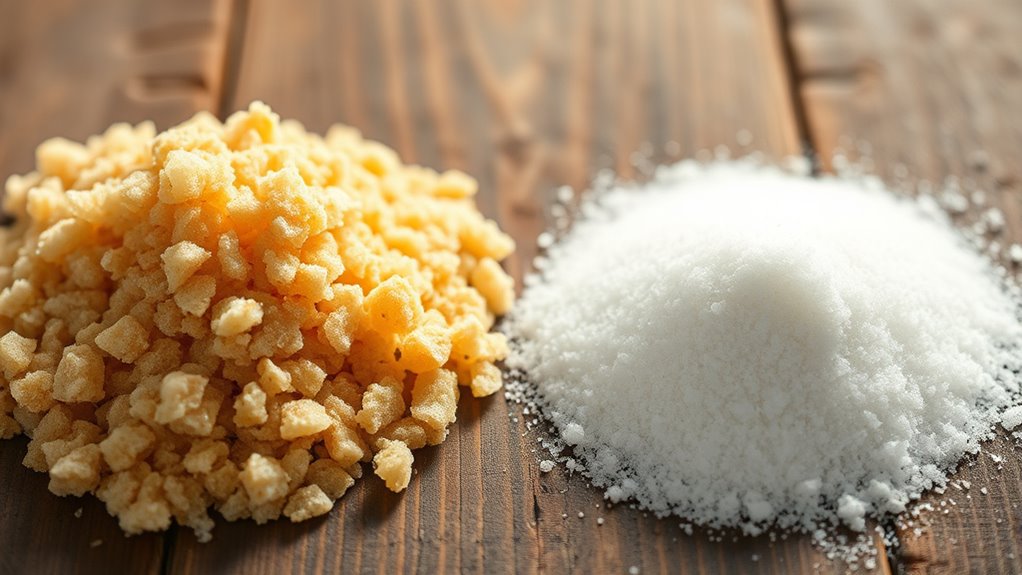If you’re choosing between coconut sugar and cane sugar, you’ll notice that coconut sugar has a lower glycemic index, leading to slower blood sugar rises and more stable energy. In baking, coconut sugar creates a darker, richer, caramel-like flavor and a denser texture, while cane sugar dissolves quickly for lighter baked goods. Their differences also extend to environmental impact and nutritional content. Exploring these details can help you make better health-conscious and culinary decisions.
Key Takeaways
- Coconut sugar has a lower glycemic index, causing slower blood sugar rises than cane sugar.
- Baking with coconut sugar results in darker color and caramel flavor, unlike the neutral cane sugar.
- Cane sugar dissolves faster, producing lighter textures, while coconut sugar may require longer mixing.
- Coconut sugar’s lower GI benefits blood sugar management, whereas cane sugar causes rapid energy spikes.
- Coconut sugar offers minor minerals and sustainability advantages over the environmentally intensive cane sugar.

When choosing between coconut sugar and cane sugar, understanding their differences can help you make healthier and more informed decisions. One key aspect to consider is their glycemic index (GI), which impacts how quickly your blood sugar levels rise after eating. Coconut sugar typically has a lower GI than cane sugar, meaning it causes a more gradual increase in blood glucose. This can be beneficial if you’re watching your blood sugar levels or managing conditions like diabetes. The slower absorption can help stabilize your energy levels and reduce cravings, contributing to better overall health benefits. Cane sugar, on the other hand, has a higher GI and is absorbed rapidly, often leading to peaks and crashes in your energy. When baking, these differences influence how your baked goods turn out. Coconut sugar’s lower GI often translates to a darker color and richer flavor, bringing a caramel-like taste to your recipes. It behaves similarly to brown sugar but may not dissolve as easily in liquids, so you might need to adjust your mixing times. Cane sugar dissolves quickly and produces a lighter texture, making it a versatile choice for most baked goods. Its more neutral flavor allows it to blend seamlessly, ensuring consistent results. From an environmental perspective, coconut sugar generally has a smaller environmental impact compared to cane sugar. Coconut palms require less land and water to produce the same amount of sugar, and harvesting is often less disruptive to ecosystems. Additionally, coconut sugar can be produced sustainably without heavy reliance on pesticides or fertilizers, making it a more eco-friendly option. Sustainable production of coconut sugar can help reduce environmental footprints. The land use involved in cane sugar cultivation is significantly higher, often leading to deforestation and habitat loss. Cane sugar production, however, involves extensive land use, significant water consumption, and often contributes to deforestation and soil degradation, raising concerns about its environmental sustainability. When baking, you should also consider the sweetness level. Coconut sugar is slightly less sweet than cane sugar, so you might need to use a bit more to achieve the same level of sweetness. Its unique flavor profile can also influence the taste of your baked goods, adding a subtle caramel note that enhances certain recipes like cookies, muffins, or bread. Additionally, the mineral content of coconut sugar can provide minor nutritional benefits compared to cane sugar. Cane sugar’s neutral sweetness makes it adaptable across a wide range of baked items, ensuring consistent sweetness and texture. Ultimately, your choice may depend on your health priorities and environmental values, as well as the specific qualities you want in your baked goods. By understanding these differences, you can better tailor your baking and dietary choices to align with your goals, whether that’s improving health benefits or reducing your ecological footprint.
Frequently Asked Questions
How Does Coconut Sugar Affect Blood Sugar Levels Long-Term?
You might notice that coconut sugar impacts your blood sugar regulation over time less drastically than regular sugar. It has a lower glycemic index, which can help maintain insulin sensitivity and prevent spikes. By choosing coconut sugar, you’re supporting better blood sugar control, reducing the risk of insulin resistance. However, moderation is key, as excessive consumption still affects your blood sugar levels and long-term health.
Can Coconut Sugar Be Used as a Direct Substitute in All Recipes?
Using coconut sugar as a direct substitute is like swapping a puzzle piece—you might need to adjust. It’s not perfect for all recipes because its flavor and moisture content differ from cane sugar. For best results, consider recipe substitution and flavor compatibility. You may need to tweak ingredients or quantities to achieve the desired texture and taste, especially in delicate baked goods.
What Are the Environmental Impacts of Producing Coconut Sugar Versus Cane Sugar?
When comparing coconut sugar and cane sugar, you should consider their environmental impacts. Coconut sugar production generally supports sustainable farming practices and has lower land use impacts, as coconut palms require less land and water. In contrast, cane sugar cultivation often involves intensive land use and can lead to deforestation and soil degradation. Choosing coconut sugar may help reduce your environmental footprint, especially if sustainability is a priority for you.
Does Coconut Sugar Contain Any Unique Nutrients Compared to Cane Sugar?
Imagine you’re choosing between coconut and cane sugar for baking. Coconut sugar has a different nutrient profile, offering small amounts of minerals like iron, zinc, and calcium, which cane sugar lacks. Its mineral content adds a slight nutritional edge, but remember, it’s still a sweetener. So, while coconut sugar provides some unique nutrients, you’ll want to use it in moderation as part of a balanced diet.
How Do Storage and Shelf Life Differ Between Coconut Sugar and Cane Sugar?
When comparing storage stability and shelf duration, coconut sugar generally lasts longer than cane sugar due to its lower moisture content, which helps prevent clumping and spoilage. You should store both in airtight containers away from heat, light, and humidity. However, cane sugar can last indefinitely if kept dry, while coconut sugar’s shelf life is typically around 2-3 years, but proper storage guarantees you maintain its quality and flavor over time.
Conclusion
So, when choosing between coconut sugar and cane sugar, consider the glycemic impact and how each behaves in baking. Coconut sugar offers a lower glycemic index but may alter your recipe’s texture, while cane sugar provides consistent sweetness. Ultimately, your choice depends on your health goals and baking needs. Isn’t it worth experimenting to find what works best for you? After all, the perfect sweetener is the one that suits your lifestyle and taste buds.









